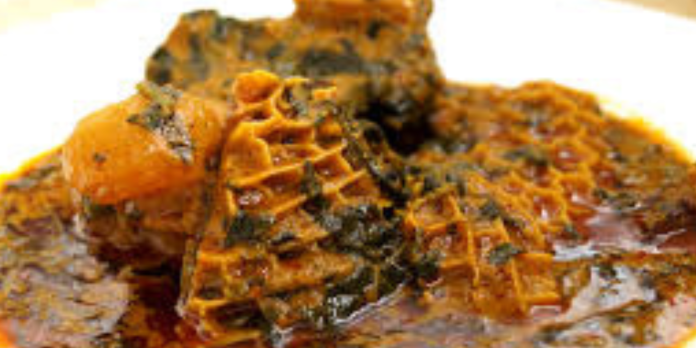Table of Contents
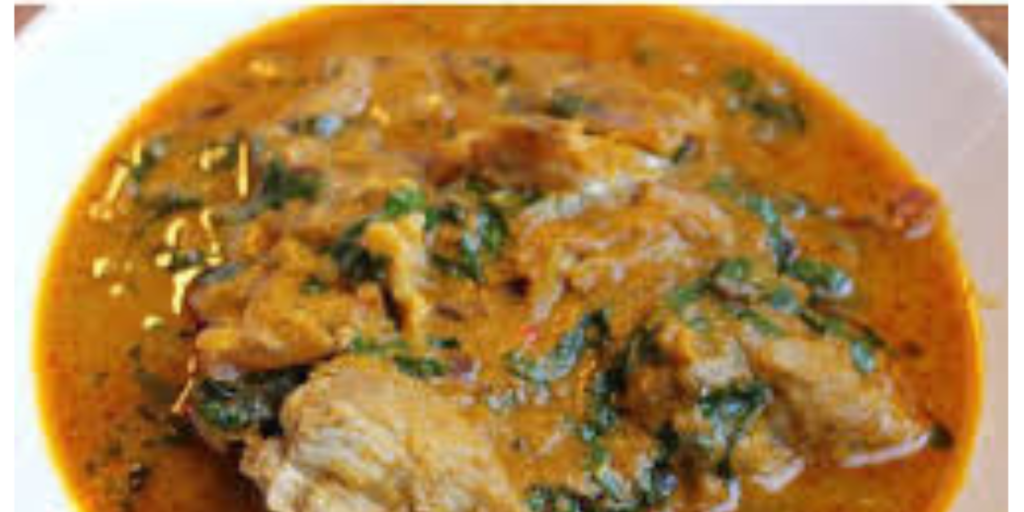
Ofe Akwu, also known as Banga soup in other parts of Nigeria, is a rich and flavorful dish that holds a special place in Igbo cuisine. This soup, made from palm fruit extract, is a testament to the culinary creativity of the Igbo people. Unlike other varieties of Banga soup found in Nigeria, Ofe Akwu is uniquely prepared with a combination of indigenous spices and ingredients that highlight the diverse and rich culture of southeastern Nigeria.
Ofe Akwu is not just a dish; it is a celebration of Igbo heritage, showcasing the region’s agricultural bounty and traditional cooking techniques. This dish, often enjoyed during family gatherings and festive occasions, embodies the warmth and hospitality of the Igbo people. In this comprehensive guide, we will explore the history, ingredients, preparation methods, variations, and cultural significance of Ofe Akwu, along with answering some frequently asked questions about this beloved dish.
Historical Background
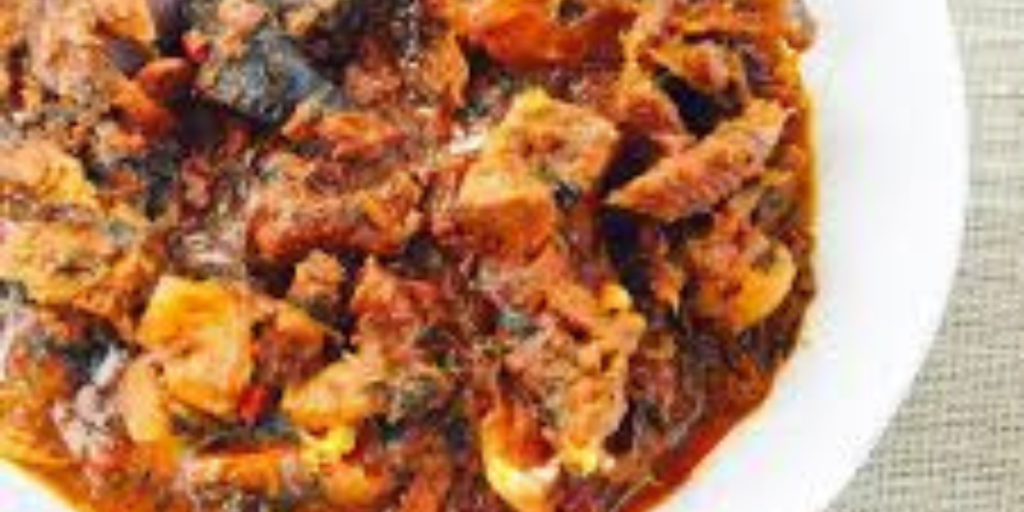
The Roots of Ofe Akwu
It’s origins can be traced back to the traditional cooking methods of the Igbo people. Historically, this dish was prepared using locally sourced ingredients, many of which were grown in home gardens. The preparation was often a communal activity, with families gathering to pound palm fruits and prepare the soup together. Over time, the recipe has evolved, but it still retains the essence of its rich heritage.
The Igbo people have always been known for their agricultural prowess, and the palm fruit (akwụ) is one of their most prized crops. The extraction of palm oil from these fruits is a labor-intensive process that involves boiling, pounding, and straining. This traditional method has been passed down through generations, ensuring that the authentic taste of Ofe Akwu remains intact.
In the past, It was primarily reserved for special occasions such as weddings, festivals, and communal feasts. It was a dish that brought people together, fostering a sense of community and shared heritage. The meticulous preparation process was seen as a labor of love, reflecting the care and attention that goes into making this soup.
The Best Delta Banga Soup Recipe of 2024
Ingredients and Their Importance
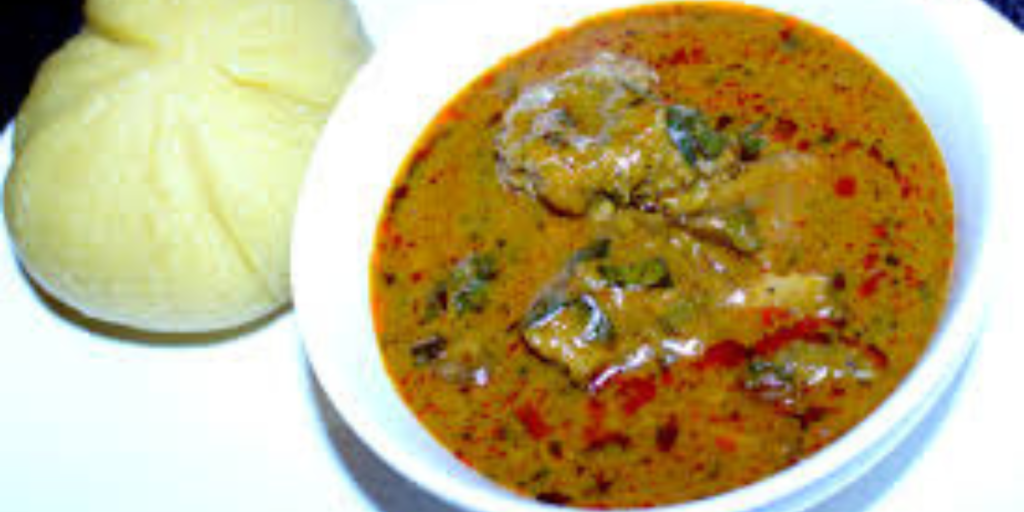
Key Ingredients for Ofe Akwu
To make a traditional Ofe Akwu, the following ingredients are essential:
- Palm Fruits (Akwu): The base of the soup, providing its distinctive flavor and rich, creamy texture.
- Meat/Fish: Typically, a combination of goat meat, beef, or dried fish is used to add depth and flavor.
- Uziza Leaves: These aromatic leaves add a peppery flavor and are a staple in many Igbo dishes.
- Ukazi Leaves: Another traditional leaf used for its slightly bitter taste and medicinal properties.
- Crayfish: Ground crayfish is used to enhance the umami flavor of the soup.
- Seasoning Cubes and Salt: To taste.
- Pepper: Fresh or dried, to add heat.
- Onions: Adds sweetness and depth to the soup.
Each of these ingredients not only contributes to the unique flavor profile of Ofe Akwu but also offers various nutritional benefits, making the soup both delicious and wholesome.
Nutritional Benefits
Palm fruits are rich in vitamins A and E, which are essential for maintaining good vision and healthy skin. The high levels of antioxidants in palm oil also contribute to its health benefits, protecting the body against oxidative stress. Meat and fish provide a good source of protein, essential for muscle growth and repair. Uziza and ukazi leaves are packed with vitamins and minerals, including calcium, iron, and vitamin C, which support overall health and well-being.
Banga Soup And Starch Nigerian Best of 2024
Preparation Steps
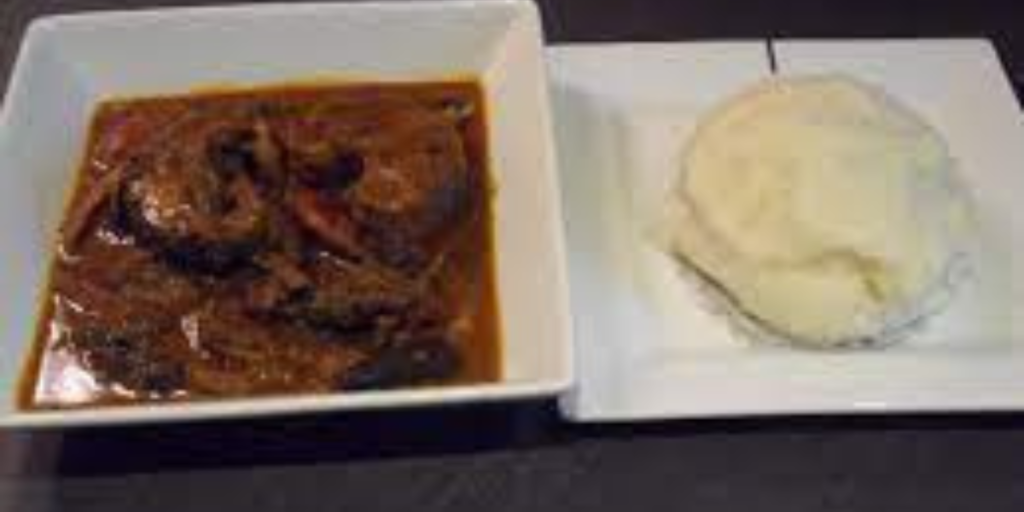
Step-by-Step Guide to Preparing Ofe Akwu
Preparing Ofe Akwu requires patience and attention to detail. Here is a detailed step-by-step guide to help you recreate this delicious dish:
- Extracting Palm Fruit Juice:
- Boil the palm fruits until tender. This typically takes about 30-45 minutes.
- Once the fruits are tender, drain the water and place the fruits in a mortar.
- Pound the fruits gently with a pestle to release the pulp. This process can also be done using a food processor for convenience.
- Add warm water to the pounded fruits and strain the mixture through a fine sieve or cheesecloth into a pot, ensuring no fibers are included. This strained liquid is the base for your soup.
- Preparing the Meat and Fish:
- Season the meat (goat, beef) and fish (dried fish or stockfish) with salt and seasoning cubes. Allow them to marinate for about 30 minutes.
- In a large pot, cook the seasoned meat and fish until tender. Save the broth from the meat and fish as it will be used in the soup.
- Cooking the Ofe Akwu:
- Pour the extracted palm fruit juice into a pot and bring to a boil over medium heat.
- Add the cooked meat, fish, and the reserved broth to the pot.
- Stir in ground crayfish, seasoning cubes, and pepper. Adjust the seasoning to taste.
- Allow the soup to simmer on low heat until it thickens to your desired consistency. This usually takes about 30-45 minutes.
- Add the uziza and ukazi leaves towards the end of the cooking process to retain their flavors and nutritional benefits. Cook for an additional 5-10 minutes.
- Final Adjustments:
- Taste the soup and adjust the seasoning if necessary.
- Allow the soup to simmer for a few more minutes until all flavors are well combined.
Variations
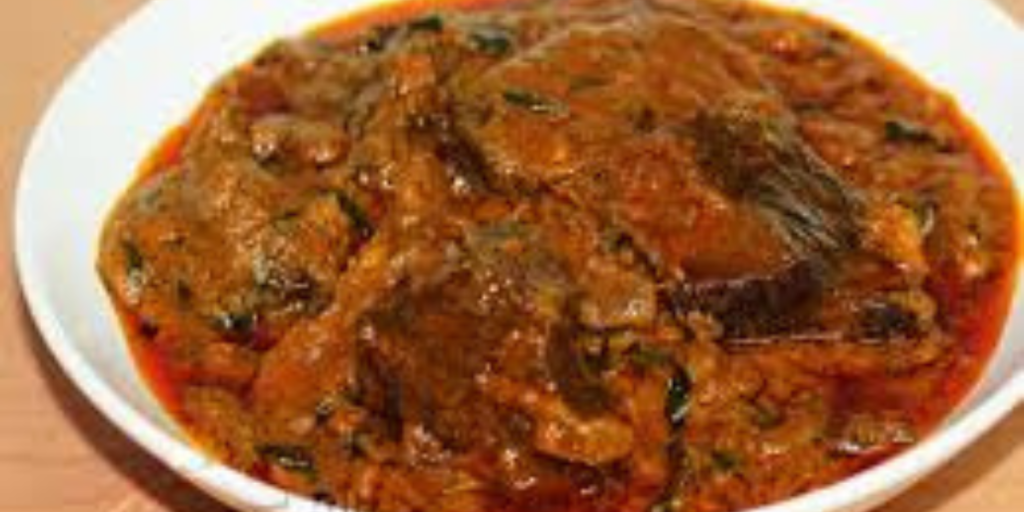
Regional Variations
Within Igboland, there are slight variations in the preparation of Ofe Akwu. For instance, some regions might prefer a thicker consistency, while others might use different local spices. In some areas, additional ingredients such as periwinkle or snails might be added for extra flavor and texture. These regional variations reflect the diverse culinary practices within Igboland and add to the richness of the dish.
Comparison with Other Nigerian Banga Soups
Comparing Ofe Akwu to other Banga soups in Nigeria, such as those from the Delta or Yoruba regions, reveals distinct differences in ingredients and flavor profiles. For example, Delta Banga soup often includes unique spices such as oburunbebe stick and beletete leaves, which give it a distinct taste. Yoruba Banga soup, on the other hand, may incorporate locust beans (iru) for added depth. Despite these differences, all variations share the common base of palm fruit extract, showcasing the versatility of this ingredient.
Modern Twists
Modern recipes for Ofe Akwu might incorporate unconventional ingredients like mushrooms or seafood, adding new dimensions to the traditional dish while keeping its essence intact. Some contemporary chefs experiment with fusion recipes, combining elements of Ofe Akwu with international cuisines to create innovative dishes that appeal to a global palate.
Serving Suggestions
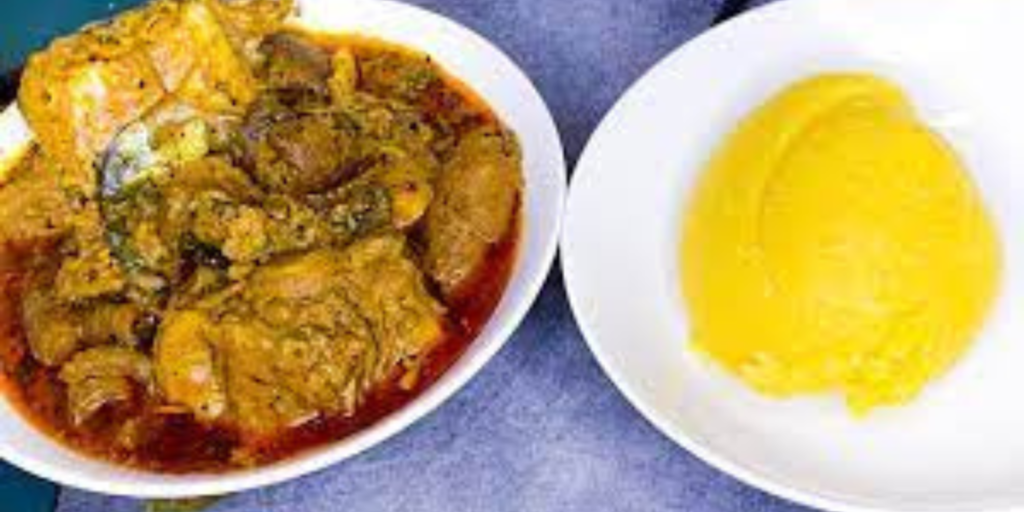
Traditional and Modern Accompaniments
Traditionally, Ofe Akwu is served with rice, pounded yam, or fufu. These starchy accompaniments help to balance the rich flavors of the soup and make for a satisfying meal. In contemporary settings, it can also be paired with quinoa, couscous, or even pasta, showcasing its versatility. Serving Ofe Akwu with these modern accompaniments can introduce the dish to a wider audience and make it a staple in diverse culinary contexts.
Best puff puff Recipe for 500g flour.
Cultural Significance and Representation
Ofe Akwu in Igbo Culture
Ofe Akwu is more than just a meal; it is a symbol of Igbo hospitality and heritage. It is often served during special occasions and ceremonies, embodying the spirit of togetherness and celebration. The rich flavors and meticulous preparation reflect the Igbo people’s love for good food and communal activities.
The dish is commonly prepared during significant events such as weddings, child naming ceremonies, and traditional festivals. Serving Ofe Akwu at these gatherings is a way to honor guests and celebrate important milestones. The communal preparation and sharing of the dish foster a sense of unity and strengthen social bonds.
Many Igbo families have their own unique stories and memories associated with Ofe Akwu. For instance, elders often recount tales of how their grandmothers taught them the intricacies of preparing the dish, emphasizing the importance of patience and precision. These stories not only preserve culinary knowledge but also pass down cultural values and traditions to younger generations.
How To Make Thick Banga Soup . Best of 2024
Frequently Asked Questions (FAQs)
1. What makes Ofe Akwu different from other Banga soups?
Ofe Akwu is distinguished by its unique blend of spices and ingredients, which are specific to the Igbo culture. The use of uziza and ukazi leaves, for example, sets it apart from other variations. These leaves add distinctive flavors and aromas that are characteristic of Igbo cuisine.
2. Can I use canned palm fruit concentrate for Ofe Akwu?
Yes, you can use canned palm fruit concentrate as a convenient alternative. However, traditionalists argue that freshly extracted palm fruit juice offers a richer flavor. If using canned concentrate, be sure to adjust the seasoning and consistency to match the traditional taste and texture.
3. How do I store leftover Ofe Akwu?
Store leftovers in an airtight container in the refrigerator for up to 3 days. Reheat thoroughly before serving. For longer storage, Ofe Akwu can be frozen for up to 3 months. When reheating frozen soup, it is advisable to thaw it in the refrigerator overnight before reheating on the stove.
4. Can I make Ofe Akwu vegetarian?
Absolutely! Simply omit the meat and fish, and use vegetable broth instead. Add more vegetables or mushrooms to enhance the flavor. The palm fruit base is rich enough to carry the dish, and the addition of hearty vegetables can provide the necessary texture and flavor.
5. What are some common mistakes to avoid when making Ofe Akwu?
- Overcooking the leaves: Adding the uziza and ukazi leaves too early can result in a loss of flavor and nutrients. These leaves should be added towards the end of the cooking process.
- Using low-quality palm fruits: The quality of the palm fruits greatly affects the taste of the soup. Fresh, ripe palm fruits yield the best results.
- Insufficient seasoning: Proper seasoning is crucial for achieving the authentic taste of Ofe Akwu. Be sure to taste and adjust the seasoning as needed during the cooking process.
Banga soup :What Can Be Used To Thicken Your Banga
Conclusion
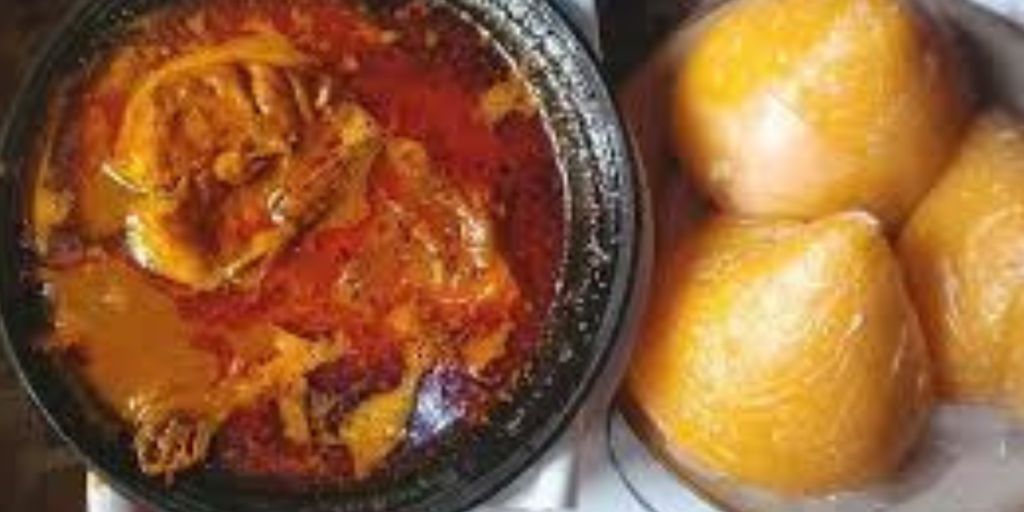
Ofe Akwu is a quintessential Igbo dish that offers a taste of the rich culinary traditions of southeastern Nigeria. Its unique combination of flavors, cultural significance, and versatility make it a must-try for anyone interested in Nigerian cuisine. By following this detailed guide, you can recreate this beloved dish and experience a piece of Igbo heritage.
Whether you are preparing Ofe Akwu for the first time or looking to perfect your technique, this comprehensive guide provides all the information you need to make a delicious and authentic soup. Embrace the flavors, enjoy the process, and savor the result – a bowl of Ofe Akwu that is sure to delight your taste buds and warm your heart.














